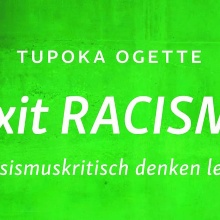In a digital lecture at the University of Stuttgart on 4 June 2020, Tupoka Ogette, author and expert on diversity and anti-discrimination, spoke about the issue of racism and how you can confront it in everyday life. The keynote speech was based on her book “exit RACISM - learn to think critically about racism”. The event was initiated by Sarah Walz, the coordinator of the Cross Cultural Mentoring Program, and was fully booked with 300 participants.
At the beginning of the event, the author referred to the status that prevents white people from perceiving racism as such. In her book, she calls this status “Happyland”. According to Ogette, whether a situation is racist is first discussed, not unmasked, and thus relativized.
Racism within society
Using numerous personal examples, the speaker described how deep-seated racism is in German society and how difficult it is for people who oppose racism or who are confronted with it. The presentation made clear that black people often experience situations in which they have to deal with the issue of racism. Stories and experiences of discrimination and racism comparable to those of Tupoka Ogette are not rare, but they are often not told. An open dialog based on respect, information, and reflection on one’s own prejudices can help to fight racism, the author explained in her lecture.
Ogette, who studied economics and African studies, also pointed out that during her university studies, research in African studies was primarily conducted by white people. She pointed out that research findings can be subjective due to the socialization of the researchers. One should also be clear about which people dominate the current debates and whether the people being discriminated against actually have their say.
Creating a framework for discussions
At the end of the event there was the opportunity to talk directly with the author. Students asked the anti-discrimination coach what they, as white students, could do to show solidarity with their black fellow students. Also, it was asked what white employees could do, for example at the university, to draw attention to the issue and to behave in an anti-racist manner. Her recommendation was to offer events like this, such as training, workshops, lectures, and open tables for students and employees. This recommendation was welcomed by the Cross Cultural Mentoring Program. Experience has shown that the topic meets with great interest.
Prof. Wolfram Ressel was pleased about the response to the event and praised the commitment of everyone at the university to diversity and mutual respect. “Especially the Diversity Day, which was recently held under the slogan ‘Intelligent through Diversity’, has shown how many ideas are being pursued at our university to give vitality to our culture of integration,” the Rector emphasized. The university’s new diversity concept creates the appropriate framework for this. “An active confrontation with the issue of racism helps to anchor tolerance in thought and action. Preventing discrimination is the key to lived diversity,” added Prof. Monilola Olayioye, Vice Rector for Early Career Researchers and Diversity.
About Tupoka Ogette:
Tupoka Ogette was born in Leipzig in 1980 and studied African Studies and Economics. She currently works as an expert on diversity and anti-discrimination, conducts training, workshops, and seminars on racism and its effects on German society, and is a speaker, consultant, and author.



